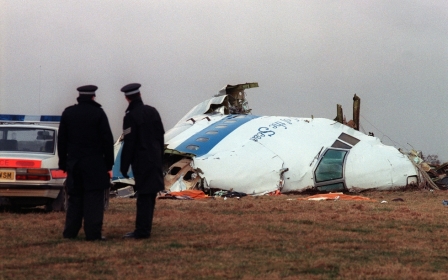Man arrested over 1984 killing of officer outside Libyan embassy in UK

More than 30 years after a British policewoman was shot dead outside the Libyan embassy in London, a Libyan man has been arrested on suspicion of murder, the police said on Thursday.
Police said this was "the first significant arrest" of the investigation into the killing of 25-year-old Yvonne Fletcher, which led Britain to sever diplomatic relations with Libya for 15 years.
The Libyan, who is in his 50s but has not been named by police, is also suspected of money laundering, along with two other Libyans who were also arrested.
"Over the past 31 years, we have never lost our resolve to solve this case," said Richard Walton, the head of counter terrorism at London's Metropolitan Police.
Fletcher had been patrolling a small, peaceful demonstration outside the embassy in London's St James's Square on 17 April 1984 when a rival demonstration of Libyan ruler Muammar Gaddafi supporters turned out.
After the group arrived, several shots were fired from within the embassy, the Metropolitan Police said in a statement. Ten anti-Gaddafi protesters were wounded.
Detectives appealed on Thursday for the help of eyewitnesses and released 14 images of individuals they want to identify, as well as video footage of the demonstration and shooting.
"Any information, however small, can help bring closure," Fletcher's family said in a statement.
The killing sparked an 11 day stand-off between British police outside the embassy - officially referred to as the Libyan People's Bureau - and those inside.
The killer is presumed to have left Britain among the 30 staff who were deported after the siege was broken under diplomatic immunity.
"We believe that the incident was part of the so-called 'stray dogs campaign' being orchestrated from Libya to attack overseas dissidents and their interests during this time," the police said.
The killing led to Britain severing diplomatic relations with Libya until 1999 and has long been an obstacle to relations between London and Tripoli, along with the 1988 bombing of a passenger jet over the Scottish town of Lockerbie.
Last month, Scottish prosecutors said they had identified two new Libyan suspects in the bombing of a Pan Am jet over the Scottish town of Lockerbie in 1988, which killed 270 people.
In 1999, Libya accepted "general responsibility" for Fletcher's death.
The overthrow of Gaddafi's government in 2011 gave investigators new hope of solving the Fletcher and Lockerbie crimes.
In 2012, Libya's then prime minister Abdel Rahim al-Kib laid a wreath at the memorial to Fletcher, and Scotland Yard has sent detectives to Libya to continue their investigations into the killing.
Fletcher's family, colleagues and friends laid floral tributes at the spot where she fell on the 30th anniversary of her death last year.
At the ceremony, Fletcher's friend and colleague John Murray recalled being in the ambulance with her and telling her he would find out what happened.
"I will get justice for Yvonne Fletcher," he said. "Bearing in mind that those were the last words she heard before she died, that's a promise I made to her and a promise I'll keep."
Stay informed with MEE's newsletters
Sign up to get the latest alerts, insights and analysis, starting with Turkey Unpacked
Middle East Eye delivers independent and unrivalled coverage and analysis of the Middle East, North Africa and beyond. To learn more about republishing this content and the associated fees, please fill out this form. More about MEE can be found here.




